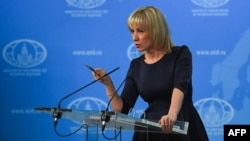The United States and the Taliban are both set to attend for the first time a multilateral conference Russia will host Friday in Moscow to discuss how to achieve peace and national reconciliation in Afghanistan.
Russian Foreign Ministry spokeswoman, Maria Zakharova, said on the eve of the meeting that delegates from 12 countries, including the U.S., will participate in the second “Moscow format consultations.”
She emphasized the conference is solely aimed at facilitating a “conducive atmosphere for bilateral or multilateral dialogue formats” to promote a negotiated solution to the Afghan problem as soon as possible.
Washington had turned down the invitation to the first meeting Moscow hosted last year, while the Taliban also had stayed away from it.
A State Department spokesperson confirmed on Wednesday that in coordination with the Afghan government, the U.S. embassy in Moscow “will send a representative to the working level to observe the discussions.”
China, Pakistan, Iran, India, Uzbekistan, Kyrgyzstan, Tajikistan, Afghanistan, Kazakhstan and Turkmenistan are among other participants. The Afghan government refused to send its officials to the meeting but has allowed a delegation of the country’s High Peace Council to take part in the event.
“The Russian side reaffirms its position that there is no alternative to a political settlement in Afghanistan and neighboring countries, as well as Afghanistan’s regional partners, need to actively work and coordinate their efforts in this direction,” Zakharova told a weekly news conference in Moscow.
A five-member delegation from the Qatar-based “political office” of the Taliban will take part in Friday’s meeting. This will be the first appearance by the Taliban at such an international conference, Zakharova emphasized.
She noted that participants will be sitting across a big table in the same hall. It was for the Taliban and the Afghan delegation to answer, however, whether there will be any direct contact or interaction between the two sides, the Russian spokeswoman said when asked whether the two warring parties will have bilateral discussions.
Taliban spokesman Zabihullah Mujahid reiterated Thursday there is no intention to engage with Afghan delegates at Friday’s meeting.
“This conference is not about holding negotiations with any party whatsoever; rather it is about finding a peaceful solution to the issue of Afghanistan. There will not be any sort of negotiations taking place with the delegation of Kabul administration,” he said.
Mujahid defended the Taliban’s participation in Moscow meeting, saying it will not be chaired or co-chaired by the Kabul government unlike previous such international gatherings.
“With participation in the meeting, the international status of the Islamic Emirate [the Taliban] will be strengthened even further Such diplomatic efforts of the Islamic Emirate showcase the active, clear and independent diplomacy and policy of the Islamic Emirate in the political field,” asserted the insurgent spokesman.
The Moscow conference comes as Washington already has initiated a direct dialogue process with the Taliban, meeting a long-running insurgent demand.
U.S. officials have held two meetings with the Qatar-based Taliban negotiators since July. The latest talks occurred last month where newly appointed special envoy for Afghanistan reconciliation, Zalamay Khalilzad, led the U.S. team.
Pakistan confirmed on Thursday the U.S.-led peace initiative prompted Islamabad to release a senior jailed Taliban leader last month.
The insurgent commander in question, Mullah Abdul Ghani Baradar, was captured in 2010 in a joint operation by Pakistani and American security operatives in Karachi, Pakistan’s largest city. The man, popularly known as Mullah Baradar, was second-in-command of the Taliban at the time of his arrest.
“His release was facilitated by Pakistan at the U.S. request in order to move forward on the shared objective of pursuing a political settlement in Afghanistan. ... He was released to provide impetus to the peace and reconciliation efforts in Afghanistan,” said Pakistani foreign ministry spokesman Mohammad Faisal.




